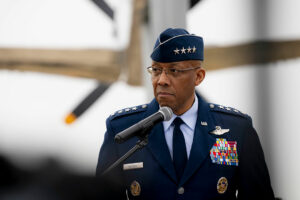
Head of Joint Chiefs of Staff in Manila to discuss ‘free and open’ Indo-Pacific
By Kyle Aristophere T. Atienza, Reporter
THE HEAD of the US Joint Chiefs of Staff arrived in the Philippines on Tuesday as part of his wider trip to the Indo-Pacific region, which Washington considers a priority amid tensions with China and nuclear threats from North Korea.
US Joint Chiefs of Staff chairman and Air Force General Charles Q. Brown, Jr. will participate in a series of engagements with Philippine military chief General Romeo S. Brawner, Jr. and other military officials, the US Defense department said in a statement.
It cited “recent strides in the long-standing US-Filipino defense relationships.”
Mr. Brown is also set to visit one of the sites under Manila’s Enhanced Defense Cooperation Agreement (EDCA) with Washington.
“In the Philippines, we have a long-standing, shared interest in regional stability that’s backed by international law,” Mr. Brown said in the statement. “The Philippines is one of our oldest treaty allies in the region.”
The Joint Chiefs of Staff is the body of the most senior uniformed leaders within the US Department of Defense that advises the US president, Defense chief, Homeland Security Council and National Security Council on military matters.
The US Defense department said America’s “robust partnerships” with key allies in the region remain central to the US plan to advance a shared vision of a free and open Indo-Pacific, citing “increased competition with China” and “threats posed by North Korea.”
In the statement, Mr. Brown cited the growth of Balikatan or shoulder-to-shoulder military exercises between the Philippines and the United States.
This year marked the 39th iteration of the war games, and the US Defense department said it’s the largest on record with about 16,000 participants from the US and Philippine military, and with Australian and French troops as well as representatives from 14 countries as international observers.
Mr. Brown also cited the expansion of the Enhanced Defense Cooperation Agreement, with the inclusion of four new sites last year.
He will tour one of the nine EDCA sites during his visit.
The Philippine Senate in 1991 rejected the renewal of a bilateral military base agreement between the two countries.
The decision led to the dismantling of an American air base in Clark, Pampanga and a naval base in Subic, Olongapo.
President Ferdinand R. Marcos, Jr. has veered away from his predecessor’s pro-China policy, boosting ties with the United States and other Indo-Pacific powers such as Japan and Australia.
The US, Japan and Australia have been at the forefront of international condemnation of Chinese ships’ harassment of Philippine vessels deployed for resupply and rotation missions within the Philippines’ exclusive economic zone in the South China Sea.
US President Joseph R. Biden, who is seeking reelection in November, and his Philippine and Japanese counterparts met at the White House in April and discussed ways to help boost Manila’s defense and economy.
“I do see that the relationship is gaining momentum,” Mr. Brown said. “I think it’s a positive trajectory.”
The US Defense department said Mr. Brown’s trip to the Indo-Pacific region follows key engagements with his global counterparts during a recent summit of the North Atlantic Treaty Organization (NATO) and last month’s conference of African Defense chiefs in Botswana.
Mr. Brown will travel to Japan later this week to meet with senior government officials and military leaders “for discussions on regional deterrence and security cooperation.”
He will also meet with US servicemen stationed at Yokota Air Base.



